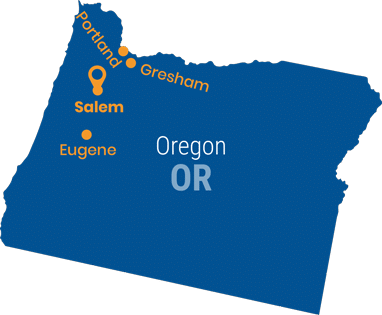What is Finance?
Oregon is a state known for its beautiful landscapes, vibrant cities, and thriving economy. As part of the Pacific Northwest region, Oregon has developed a strong financial sector that plays a crucial role in the state's overall economic growth. Oregon's finance sector encompasses an expansive variety of activities spanning banking, insurance, investment management, and real estate. Oregon's financial institutions provide essential services to individuals and businesses - aiding economic activity while facilitating transactions. Due to Oregon's favorable business climate, strategic location, and highly skilled workforce - it has attracted numerous financial institutions making Oregon an epicenter for finance in the region.
According to the Oregon Employment Department, as of May 2020, there were approximately 154,400 individuals employed in the finance sector in the state. This includes occupations such as financial analysts, accountants, loan officers, insurance underwriters, and financial managers, among others. The number of employed individuals in finance has steadily increased over the years, reflecting the sector's growth and the demand for financial services in Oregon.
The finance industry in Oregon offers a wide range of career opportunities for individuals with diverse skills and educational backgrounds. Many professionals in the finance sector hold degrees in finance, accounting, economics, or business administration. However, the industry also values individuals with specialized knowledge in areas such as risk management, financial planning, and investment analysis.
Oregon is home to both traditional financial institutions as well as an increasing number of fin-tech startups and companies that utilize technology for innovative financial solutions, providing individuals with exciting opportunities at the intersection of finance and tech. Whether you are a recent graduate looking to start your career or a seasoned professional considering a move to the finance industry, Oregon offers a promising environment. The state's strong economy, supportive business climate, and diverse range of financial institutions create a conducive atmosphere for growth and success in the finance sector.

Featured Online Programs
Top Ranked Campus & Online Finance Programs in Oregon
Oregon State University
Score: 85.39
- Undergraduate Tuition
- In-State: $13,494
- Out-of-State:$35,664
- Net Price: $21,868
- Acceptance Rate: 79%
- Retention Rate: 87%
- Graduation Rate: 71%
- Total Enrollment: 35,622
- Undergrad Students: 30,021
- Graduate Students: 5,601
- Grads Salary: $80,000
- Student-to-faculty: 20:1
University of Portland
Score: 80.73
- Undergraduate Tuition
- In-State: $54,900
- Out-of-State:$54,900
- Net Price: $34,951
- Acceptance Rate: 95%
- Retention Rate: 83%
- Graduation Rate: 80%
- Total Enrollment: 3,457
- Undergrad Students: 3,136
- Graduate Students: 321
- Grads Salary: $83,000
- Student-to-faculty: 9:1
Portland State University
Score: 80.68
- Undergraduate Tuition
- In-State: $11,238
- Out-of-State:$30,138
- Net Price: $12,509
- Acceptance Rate: 91%
- Retention Rate: 75%
- Graduation Rate: 53%
- Total Enrollment: 20,519
- Undergrad Students: 15,960
- Graduate Students: 4,559
- Grads Salary: $75,000
- Student-to-faculty: 16:1
University of Oregon
Score: 79.01
- Undergraduate Tuition
- In-State: $15,669
- Out-of-State:$43,302
- Net Price: $23,917
- Acceptance Rate: 85%
- Retention Rate: 85%
- Graduation Rate: 71%
- Total Enrollment: 23,786
- Undergrad Students: 19,963
- Graduate Students: 3,823
- Grads Salary: $73,000
- Student-to-faculty: 20:1
Linfield University
Score: 77.25
- Undergraduate Tuition
- In-State: $49,530
- Out-of-State:$49,530
- Net Price: $31,462
- Acceptance Rate: 88%
- Retention Rate: 79%
- Graduation Rate: 65%
- Total Enrollment: 1,726
- Undergrad Students: 1,678
- Graduate Students: 48
- Grads Salary: $79,000
- Student-to-faculty: 10:1
Online Finance Education in Oregon
A finance professional is an individual who possesses the knowledge and expertise in managing financial transactions and making informed decisions regarding investments, budgeting, and financial planning. They play a crucial role in ensuring the financial health and stability of an organization or individual. To become a finance professional, one usually needs a strong educational background in finance or a related field, such as economics or accounting. A bachelor's degree is often the minimum requirement, but many professionals also choose to pursue advanced degrees such as a Master of Business Administration (MBA) or a Chartered Financial Analyst (CFA) designation.
The responsibilities of a finance professional can vary depending on their specific role and industry. They may work in various sectors such as banking, investment firms, corporate finance, or government agencies. Regardless of their specialization, finance professionals typically perform tasks such as financial analysis, risk assessment, financial forecasting, and asset management. One of the key roles of a finance professional is to analyze financial data to provide insights and recommendations to decision-makers. This involves understanding financial statements, key performance indicators, and market trends to help identify opportunities for growth and improvement. They also play a critical role in managing and allocating financial resources efficiently.
In addition to technical skills, finance professionals also need to possess strong analytical and problem-solving abilities. They must be able to interpret complex financial information and communicate it effectively to stakeholders. Attention to detail and ethical decision-making are essential traits in this field as finance professionals often handle sensitive and confidential information.
Online Associates (AS)

Having a strong foundation in finance is essential for anyone looking to enter the world of business. One degree program that provides this foundation is an associate degree in finance. While not as advanced as a bachelor's or master's degree, pursuing an associate degree in finance can be a valuable steppingstone toward a successful career in the field.
One key advantage of earning an associate degree in finance is the relatively short time commitment required. Typically taking just two years to complete, this program allows students to quickly gain knowledge and skills that are directly applicable to entry-level positions in various financial sectors. Additionally, many community colleges and technical schools offer associate degrees in finance at affordable tuition rates, making it a more accessible option for students who may have financial constraints.
Another benefit of pursuing an associate degree in finance is the flexibility it offers. Graduates can find employment opportunities across different industries including banking institutions or insurance companies. The curriculum typically covers a wide range of topics such as accounting principles, financial analysis techniques, and investment strategies. This broad understanding of finance gives graduates the versatility to apply their skills within diverse roles and organizations.
Online Bachelors (BS or B.Fin)

A bachelor's degree in finance is more than just a piece of paper – it’s the gateway to a world of endless opportunities and possibilities. These degrees equip students with the necessary skills and knowledge to navigate the complex world of finance, from managing investments to analyzing financial data. It deepens one's understanding of financial concepts such as risk management, financial planning, and asset valuation.
Moreover, pursuing a bachelor's degree in finance not only opens doors for lucrative career options, but can also offer invaluable real-world experiences. Many programs offer internships or cooperative education experiences where students can gain hands-on experience working at prestigious financial institutions or corporations. These practical experiences are essential for building a strong foundation in finance and developing problem-solving abilities that are highly sought after by employers.
In addition to its practical applications, a bachelor's in this field also promotes critical thinking and analytical skills. Students are encouraged to think independently and critically analyze complex financial situations, enabling them to make informed decisions even in uncertain economic times. The curriculum typically includes courses on economics, statistics, accounting, business law, and risk management – all designed to enhance students' analytical abilities and prepare them for the challenges of the finance industry.
Online Masters (MS or M.Fin)

A master's degree in finance is a highly esteemed qualification that opens doors for even more lucrative job prospects in the finance industry. These programs offer in-depth understanding of financial principles, quantitative analysis, and investment strategies. But, more than just equipping students with technical knowledge, a master's degree in finance also hones critical thinking skills and provides a strong foundation for decision-making under uncertainty.
One significant advantage of pursuing a master's degree in finance is the opportunity to network with industry professionals. Many universities offering these programs have collaborations with renowned firms and financial institutions, providing students with access to internships and job placements. This networking not only builds connections but also ensures exposure to real-world challenges faced by professionals in the field of finance.
Furthermore, a master's degree in finance prepares students for specialized roles such as financial analyst, risk manager, or investment banker. These roles require expertise beyond what is covered in an undergraduate program and demand practical application of theoretical concepts learned during coursework. With the increasing complexity of global markets, employers are increasingly seeking candidates who can analyze data effectively to make informed decisions and mitigate risks.
Online Doctorate (PhD)
Earning a PhD in finance offers a unique opportunity for individuals looking to advance their knowledge and expertise in the field. These rigorous programs are designed for those who are passionate about finance and aspire to become leaders, researchers, or educators within the industry. Apart from enhancing your technical skills in areas such as financial analysis, investment management, and risk assessment - undertaking a doctoral degree also allows you to critically analyze complex financial concepts and contribute to the existing body of knowledge through original research.
One key advantage of pursuing a PhD in this field is the vast array of career opportunities it provides access to. Alongside traditional academic roles in universities and research institutions, graduates can also thrive in government agencies, financial advisory firms, consulting companies, and even multinational corporations. Additionally, these programs equip students with practical skills like data analysis techniques and statistical modeling, which are highly sought after by employers across different industries. With this wide range of career paths available to them, PhD holders have the flexibility to choose a role that aligns with their interests and goals while making meaningful contributions to both academia and industry practices.
However, it's important to note that earning a PhD in finance requires dedication and perseverance due to its demanding nature. These programs typically span four to six years, during which students engage in extensive coursework alongside conducting independent research projects under the guidance of experienced faculty members. While challenging, this commitment ultimately cultivates strong problem-solving abilities and effective communication skills – qualities that are invaluable for success not only within academia but also within high-level financial roles.
Check out our Financial Aid Guide Get Additional finance resources and scholarshipsOnline Certifications
One aspect of the finance industry that often goes overlooked is the value of finance certifications. While a college degree in finance certainly provides a strong foundation, certifications can give professionals an edge in today's competitive job market. These certifications not only demonstrate expertise and knowledge, but also show a commitment to continuous learning and professional development.
One popular certification in the finance field is the Certified Financial Planner (CFP) designation. This certification covers various aspects of financial planning including investments, taxes, retirement planning, estate planning, and risk management. By obtaining this certification, professionals can position themselves as trusted advisors who can provide comprehensive financial planning services to individuals and families.
Another well-regarded finance certification is the Chartered Financial Analyst (CFA) designation. This certification focuses on investment analysis and portfolio management skills. CFA holders are regarded as experts in their field who have demonstrated an ability to analyze complex financial data, evaluate investment opportunities effectively, and construct optimal portfolios. The combination of technical expertise and practical experience gained through this rigorous certification makes CFAs highly sought by both employers and clients alike.
In conclusion, while earning a degree in finance from a reputable college or university is undoubtedly important for building a solid foundation in the field, obtaining relevant finance certifications can provide individuals with even more credibility and career advancement opportunities. Whether it's becoming a Certified Financial Planner, Chartered Financial Analyst, or pursuing other relevant certifications within the industry - these designations demonstrate dedication to one's craft and the desire to continually improve one's skills.
Become a Finance Professional in Oregon
Oregon offers a wide range of opportunities for individuals looking to establish themselves as finance professionals. Whether you are a recent graduate or looking to transition into a new field, here are some steps to help you become a finance professional in Oregon.
-
Step 1: Obtain a Relevant Degree
One of the first steps towards becoming a finance professional is earning a relevant degree. You may consider pursuing a bachelor's degree in finance, accounting, economics, or a related field. This will provide you with a solid foundation of knowledge and skills necessary to succeed in the finance industry.
-
Step 2: Gain Practical Experience
While obtaining a degree is important, practical experience is equally crucial. You can look for internships or entry-level positions in finance-related roles to gain hands-on experience either while you are still in school or right after graduation. This will allow you to apply theoretical knowledge in a real-world setting and develop practical skills that are highly valued by employers.
-
Step 3: Obtain Relevant Certifications
Certifications can significantly enhance your credibility and marketability as a finance professional. You may want to consider pursuing certifications such as the Certified Financial Planner (CFP) or Chartered Financial Analyst (CFA) to showcase your expertise and commitment to the field. These certifications require passing rigorous exams and meeting certain experience requirements, but they can greatly enhance your career prospects.
-
Step 4: Network with Professionals in the finance Industry
Networking is essential in any industry, and finance is no exception. You may attend industry events or join professional organizations to connect with finance professionals in Oregon. Networking can lead to valuable connections, mentorship opportunities, and potential job openings.
What Can I Do with a Bachelor's in Finance?
A bachelor's degree in finance can open a world of diverse career opportunities. While many people associate finance with traditional roles like investment banking or financial analysis, the truth is that finance graduates can pursue a variety of paths in both the public and private sectors.
One exciting option for finance graduates is to work as a financial planner. In this role, you would help individuals and families manage their money effectively by creating comprehensive financial plans tailored to their specific needs and goals. By providing guidance on topics such as budgeting, saving, investing, and retirement planning, you could make a meaningful impact on your clients' lives while enjoying a rewarding career.
Another intriguing opportunity lies in the field of corporate finance. Here, you could work within organizations to manage and optimize their finances. This could involve tasks such as analyzing financial data to make strategic business recommendations, overseeing budgeting processes, managing cash flow, or evaluating investment opportunities. Corporate finance offers the chance to blend analytical skills with decision-making acumen in order to drive organizational success.
Overall, a bachelor's degree in finance equips you with an invaluable skill set that can be applied across various industries and sectors. Whether it's helping individuals plan for their futures or guiding corporations towards fiscal excellence, there are countless ways for finance professionals to make a meaningful impact in today's complex economic landscape.
Potential Careers for Finance Graduates
- Financial and Investment Analyst:
Financial and investment analysts are responsible for collecting financial information, analyzing investment opportunities, and offering advice that will maximize company financial performance. Working closely with senior management and stakeholders, they will develop and implement effective investment strategies.
Necessary Requirements:
- Bachelor's degree in finance, economics, or a related field (master's degree preferred)
- Proven experience as a financial analyst or investment analyst
- Strong knowledge of financial markets, investment principles, and portfolio management strategies
- Proficient in financial modeling techniques and statistical analysis tools
Estimated Salary
- The median annual wage for financial and investment analysts in the US in 2022 was $96,220
- The mean annual wage for financial and investment analysts in Oregon is $101,700
- Accountant:
Accountants may be responsible for overseeing all financial transactions within a company, ensuring accuracy and conformity with company policies and accounting principles. Accountants will create and maintain financial records, reconcile accounts, assist in the production of financial statements, help auditors during audits as needed, analyze data analysis results, and suggest process improvement measures as appropriate.
Necessary Requirements:
- Bachelor's degree in accounting or a related field
- Proven work experience as an accountant or a similar role
- Strong knowledge of accounting principles and regulations
- Proficiency in using accounting software (e.g., QuickBooks, SAP)
- Excellent attention to detail and organizational skills
- Strong analytical and problem-solving abilities
Estimated Salary
- The median annual wage for accountants and auditors in the US in 2022 was $78,000
- The mean annual wage for accountants and auditors in Oregon is $80,330
- Investment Banker:
Investment bankers provide financial advisory services to corporations, governments, and individuals. Their role is to assist with capital raising by issuing and selling securities; they also help manage merger and acquisition transactions, restructuring initiatives, or any other necessary transactions.
Necessary Requirements:
- Bachelor's degree in finance, economics, or a related field; an MBA or CFA designation is preferred
- Proven experience in investment banking or a related field, with a strong understanding of financial markets and products
Estimated Salary
- The median annual wage for securities, commodities, and financial services sales agents in the US in 2022 was $67,480
- The mean annual wage for securities, commodities, and financial services sales agents in Oregon is $85,490
- Loan Officer:
Loan officers are responsible for reviewing, authorizing, and recommending approval of loan applications. They assess creditworthiness of applicants while assuring they comply with company policies and regulations. Loan officers work closely with clients to understand their financial needs before suggesting suitable loan products to meet them.
Necessary Requirements:
- Proven experience as a loan officer or a similar role in a financial institution
- In-depth knowledge of lending principles, practices, and regulations
Estimated Salary
- The median annual wage for loan officers in the US in 2022 was $65,740
- The mean annual wage for loan officers in Oregon is $94,510
- Chief Financial Officer (CFO):
A CFO is responsible for overseeing the financial operations of the organization and providing strategic financial guidance. They will work closely with the CEO and other senior executives to drive financial performance and ensure the company's financial stability.
Necessary Requirements:
- Bachelor's degree in finance or a related field; MBA or CPA preferred
- Proven experience as a CFO or in a senior finance role
- Strong knowledge of financial planning and analysis, budgeting, forecasting, and accounting principles
Estimated Salary
- The mean annual wage for chief executives in the US in 2022 was $246,440
- The mean annual wage for chief executives in Oregon is $291,720
- Budget Analyst:
Budget analysts are responsible for analyzing financial data, creating budget reports, and monitoring spending to ensure it falls within budgetary guidelines. They work alongside department managers in creating budget plans, reviewing requests for funds, and suggesting cost-cutting measures.
Necessary Requirements:
- Bachelor's degree in finance, accounting, or a related field
- Proven experience as a budget analyst or similar role
- Strong analytical skills and attention to detail
- Proficient in financial analysis software and spreadsheet tools
- Knowledge of budgeting principles and procedures
- Excellent communication and interpersonal skills
- Ability to work independently and meet tight deadlines
Estimated Salary
- The median annual wage for budget analysts in the US in 2022 was $82,260
- The mean annual wage for budget analysts in Oregon is $87,000
- Auditor:
An auditor is accountable for conducting in-depth examinations of financial records, statements, and transactions to ensure accuracy, adherence to established guidelines, compliance with laws and regulations, and to catch any discrepancies or irregularities in financial reporting while offering suggestions on corrective actions that should be taken.
Necessary Requirements:
- Bachelor's degree in accounting, finance, or a related field
- Professional certification (e.g., certified public accountant) is highly desirable
- Proven experience as an auditor or in a similar role, preferably in a public accounting firm or internal audit department
- Strong knowledge of auditing standards, principles
Estimated Salary
- The median annual wage for accountants and auditors in the US in 2022 was $78,000
- The mean annual wage for accountants and auditors in Oregon is $80,330
- Tax Preparer:
As a tax preparer, you would be responsible for accurately preparing and filing tax returns for individuals and businesses. You will work closely with clients to gather necessary financial information and ensure compliance with tax laws and regulations. You’ll need a strong understanding of tax codes and regulations, excellent math skills, and the ability to effectively communicate complex tax concepts to clients.
Necessary Requirements:
- Bachelor's degree in accounting, finance, or a related field (preferred)
- Proven experience as a Tax Preparer or a similar role
Estimated Salary
- The mean annual wage for tax preparers in the US in 2022 was $55,840
- The mean annual wage for tax preparers in Oregon is $61,420
Search All Programs






